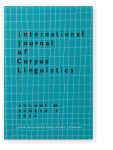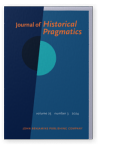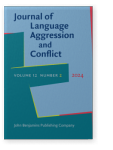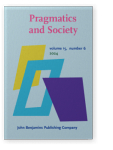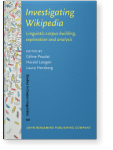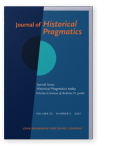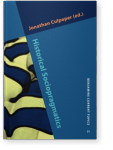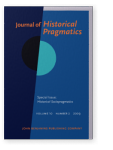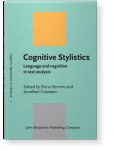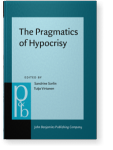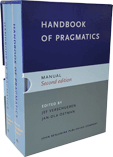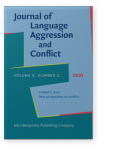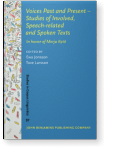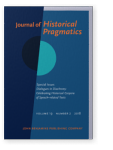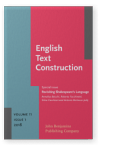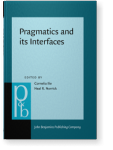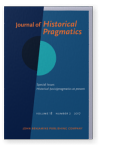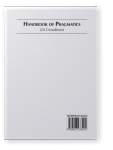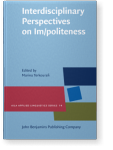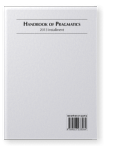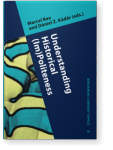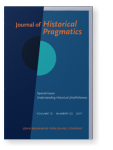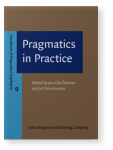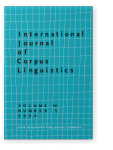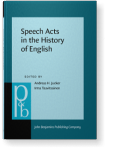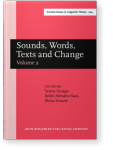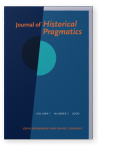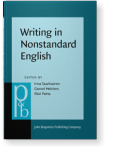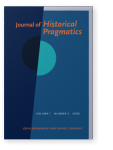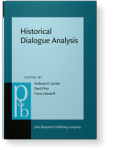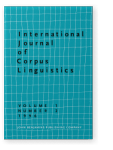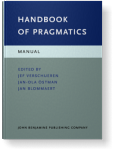Jonathan Culpeper
List of John Benjamins publications for which Jonathan Culpeper plays a role.
Journals
ISSN 2213-1272 | E-ISSN 2213-1280
Book series
Historical Pragmatics today: Articles in honour of Andreas H. Jucker
Edited by Irma Taavitsainen and Jonathan Culpeper
Special issue of Journal of Historical Pragmatics 22:2 (2021) v, 143 pp.
Subjects Discourse studies | Historical linguistics | Pragmatics
Historical Sociopragmatics
Edited by Jonathan Culpeper
[Benjamins Current Topics, 31] 2011. vii, 135 pp.
Subjects English linguistics | Historical linguistics | Pragmatics | Sociology
Historical Sociopragmatics
Edited by Jonathan Culpeper
Special issue of Journal of Historical Pragmatics 10:2 (2009) 145 pp.
Subjects Discourse studies | Historical linguistics | Pragmatics
Cognitive Stylistics: Language and cognition in text analysis
Edited by Elena Semino and Jonathan Culpeper
[Linguistic Approaches to Literature, 1] 2002. xvi, 333 pp.
Subjects Cognition and language | Cognitive linguistics | Pragmatics | Theoretical literature & literary studies
2024 Chapter 11. An epilogue and note on cross-cultural hypocrisy The Pragmatics of Hypocrisy, Sorlin, Sandrine and Tuija Virtanen (eds.), pp. 256–263 | Chapter
This chapter very briefly comments on some of the chapters of this volume, and then focuses on what has not been covered: hypocrisy across cultures (and languages). With a particular focus on British English and culture, it notes synchronic contrasts, specifically with Israeli “dugri” speech,… read more
2022 Stylistics Handbook of Pragmatics: Manual, Verschueren, Jef and Jan-Ola Östman (eds.), pp. 1345–1354 | Chapter
2021 The metalinguistics of offence in (British) English: A corpus-based metapragmatic approach New perspectives on conflict, pp. 185–214 | Article
Offence is a central concept in impoliteness, aggression and conflict research, yet has received only passing mention in definitions of impoliteness and related concepts. Janicki (2017) argues that impoliteness and language aggression scholars are needlessly worried about definitions. We use… read more
2021 Politeness reciprocity in Shakespeare’s dialogue: The case of thanks Historical Pragmatics today: Articles in honour of Andreas H. Jucker, Taavitsainen, Irma and Jonathan Culpeper (eds.), pp. 202–224 | Article
Recently, it has been proposed that (im)politeness in interaction today is governed in large part by a Principle of (Im)politeness Reciprocity (Culpeper and Tantucci 2021). This paper investigates whether politeness reciprocity works similarly in early modern English – specifically, in the plays… read more
2021 Introduction Historical Pragmatics today: Articles in honour of Andreas H. Jucker, Taavitsainen, Irma and Jonathan Culpeper (eds.), pp. 161–163 | Introduction
2020 Foreword Voices Past and Present - Studies of Involved, Speech-related and Spoken Texts: In honor of Merja Kytö, Jonsson, Ewa and Tove Larsson (eds.), pp. xi–xiv | Foreword
2020 Chapter 2. Pragmatic noise in Shakespeare’s plays Voices Past and Present - Studies of Involved, Speech-related and Spoken Texts: In honor of Merja Kytö, Jonsson, Ewa and Tove Larsson (eds.), pp. 11–30 | Chapter
Pragmatic noise, first coined in Culpeper and Kytö (2010), refers to the semi-natural noises, such as ah, oh, and ha, that have evolved to express a range of pragmatic and discoursal functions. Taking advantage of the regularised spellings and grammatically tagged texts of the Enhanced… read more
2018 Affirmatives in Early Modern English: Yes, yea and ay Dialogues in Diachrony: Celebrating Historical Corpora of Speech-related Texts, Kytö, Merja and Terry Walker (eds.), pp. 243–264 | Article
This study examines the affirmatives yes, yea and ay in Early Modern English, more specifically in the period 1560 to 1760. Affirmatives have an obvious role as responses to yes/no questions in dialogues, and so this study demanded the kind of dialogical material provided by the Corpus of… read more
2018 Measuring emotional temperatures in Shakespeare’s drama Revisiting Shakespeare's Language, Baicchi, Annalisa, Roberta Facchinetti, Silvia Cacchiani and Antonio Bertacca (eds.), pp. 10–37 | Article
This paper demonstrates how the computational analysis of Shakespeare’s plays can map the emotional language used across individual plays and across the canon more broadly, affording new insights. It explains how we adapted the “sentiment analysis” tool SentiStrength for use with Early Modern… read more
2018 Integrative pragmatics and (im)politeness theory Pragmatics and its Interfaces, Ilie, Cornelia and Neal R. Norrick (eds.), pp. 213–239 | Chapter
In this chapter, we first discuss the role that pragmatics has played in the development of (im)politeness theory, and the recent move towards a middle ground that integrates classic and discursive approaches to (im)politeness. We outline the key tenets of integrative pragmatics that afford such… read more
2017 The influence of Italian manners on politeness in England, 1550–1620 Historical (socio)pragmatics at present, Włodarczyk, Matylda and Irma Taavitsainen (eds.), pp. 195–213 | Article
This paper focuses on the influence of Italian conduct manuals, as translated into English, in the second half of the sixteenth century and early seventeenth century. I approach this task in two ways. One is to trace the rise of the term manners, and also to examine the words with which it… read more
2017 Linguistic impoliteness and religiously aggravated hate crime in England and Wales Journal of Language Aggression and Conflict 5:1, pp. 1–29 | Article
Despite its centrality to religiously aggravated hate crime recorded in England and Wales, the nature of the language used has been neglected in research. This paper, based on a unique dataset, aims to rectify this. It takes its approach from the field of linguistic impoliteness, a field that… read more
2015 Geoffrey Leech, 1936-2014 – The pragmatics legacy Handbook of Pragmatics: 2015 Installment, Östman, Jan-Ola and Jef Verschueren (eds.) | Article
2015 Epilogue: The “How” and the “What” of (Im)politeness Interdisciplinary Perspectives on Im/politeness, Terkourafi, Marina (ed.), pp. 267–276 | Article
2013 Impoliteness Handbook of Pragmatics: 2013 Installment, Östman, Jan-Ola and Jef Verschueren (eds.), pp. 1–18 | Article
2012 Nineteenth-century English politeness: Negative politeness, conventional indirect requests and the rise of the individual self Understanding Historical (Im)Politeness: Relational linguistic practice over time and across cultures, Bax, Marcel and Dániel Z. Kádár (eds.), pp. 49–80 | Article
In this paper we argue that the kind of individualistic ethos Brown and Levinson’s (1987) politeness model is accused of — and in particular its notion of (non-imposition) negative face — is not simply a reflection of British culture, but a reflection of British culture at a specific point in time.… read more
2011 Identifying key sociophilological usage in plays and trial proceedings (1640-1760): An empirical approach via corpus annotation Historical Sociopragmatics, Culpeper, Jonathan (ed.), pp. 109–132 | Article
2011 Historical sociopragmatics: An introduction Historical Sociopragmatics, Culpeper, Jonathan (ed.), pp. 1–8 | Article
2011 Nineteenth-century English politeness: Negative politeness, conventional indirect requests and the rise of the individual self Understanding Historical (Im)Politeness, Bax, Marcel and Dániel Z. Kádár (eds.), pp. 49–81 | Article
In this paper we argue that the kind of individualistic ethos Brown and Levinson’s (1987) politeness model is accused of — and in particular its notion of (non-imposition) negative face — is not simply a reflection of British culture, but a reflection of British culture at a specific point in time.… read more
2011 Stylistics Pragmatics in Practice, Östman, Jan-Ola and Jef Verschueren (eds.), pp. 295–305 | Article
2009 Identifying key sociophilological usage in plays and trial proceedings (1640–1760): An empirical approach via corpus annotation Historical Sociopragmatics, Culpeper, Jonathan (ed.), pp. 286–309 | Article
In this paper, we argue that there is another approach to the study of historical pragmatics beyond those explicitly mentioned in Jacobs and Jucker (1995). We label this approach “sociophilology”. Moreover, we demonstrate how this approach can be effectively pursued by combining two corpus… read more
2009 Keyness: Words, parts-of-speech and semantic categories in the character-talk of Shakespeare’s Romeo and Juliet International Journal of Corpus Linguistics 14:1, pp. 29–59 | Article
This paper explores keywords, key part-of-speech categories and key semantic categories and their role in text analysis. The first part of the paper addresses a set of issues relating to the definition of keywords and their history, the settings used in deriving keywords, the choice of reference… read more
2009 Historical sociopragmatics: An introduction Historical Sociopragmatics, Culpeper, Jonathan (ed.), pp. 179–186 | Article
2008 Requests and directness in Early Modern English trial proceedings and play-texts, 1640-1760 Speech Acts in the History of English, Jucker, Andreas H. and Irma Taavitsainen (eds.), pp. 45–84 | Article
2002 A cognitive stylistic approach to characterisation Cognitive Stylistics: Language and cognition in text analysis, Semino, Elena and Jonathan Culpeper (eds.), pp. 251–277 | Chapter
2002 Lexical bundles in Early Modern English dialogues: A window into the speech-related language of the past Sounds, Words, Texts and Change: Selected papers from 11 ICEHL, Santiago de Compostela, 7–11 September 2000, Fanego, Teresa, Belén Méndez-Naya and Elena Seoane (eds.), pp. 45–63 | Article
2002 Foreword Cognitive Stylistics: Language and cognition in text analysis, Semino, Elena and Jonathan Culpeper (eds.), pp. ix–xvi | Foreword
2000 Constructing witches and spells: Speech acts and activity types in Early Modern England Journal of Historical Pragmatics 1:1, pp. 97–116 | Article
In this paper, we highlight the centrality of verbs relating to verbal activities in witchcraft narratives in the Early Modern English period, and focus on speech act verbs used to refer to witches’ curses. In the first part, we refer to various classifications of speech act verbs and to Searle’s… read more
2000 “Pills to Purge Melancholy” — Nonstandard Elements in A Dialogue Against the Feuer Pestilence Writing in Nonstandard English, Taavitsainen, Irma, Gunnel Melchers and Päivi Pahta (eds.), pp. 151–170 | Article
2000 Data in historical pragmatics: Spoken interaction (re)cast as writing Journal of Historical Pragmatics 1:2, pp. 175–199 | Article
In this paper we examine four speech-related text types in terms of how linguistically close they are to spoken face-to-face interaction. Our “conversational” diagnostics include lexical repetitions, question marks (as an indicator of question-answer adjacency pairs), interruptions, and… read more
1999 Modifying Pragmatic Force: Hedges in Early Modern English Dialogues Historical Dialogue Analysis, Jucker, Andreas H., Gerd Fritz and Franz Lebsanft (eds.), pp. 293–312 | Article
1996 The Borrowing of Classical and Romance Words into English: A Study Based on the Electronic Oxford English Dictionary International Journal of Corpus Linguistics 1:2, pp. 199–218 | Article
This paper describes a study designed to investigate the effect of Classical and Romance vocabulary on the English lexicon. The study involved a series of computer searches, using the CD-ROM version of the Oxford English Dictionary (1989). Our aim was to discover how many and at what point in time… read more
1995 Stylistics Handbook of Pragmatics: Manual, Verschueren, Jef, Jan-Ola Östman and Jan Blommaert † (eds.), pp. 513–520 | Article
